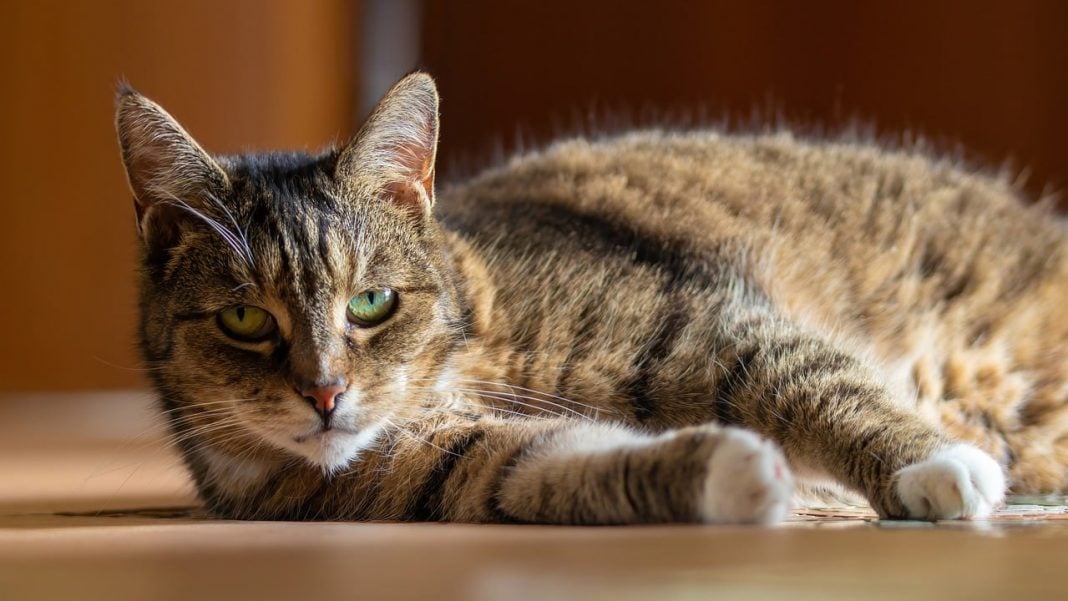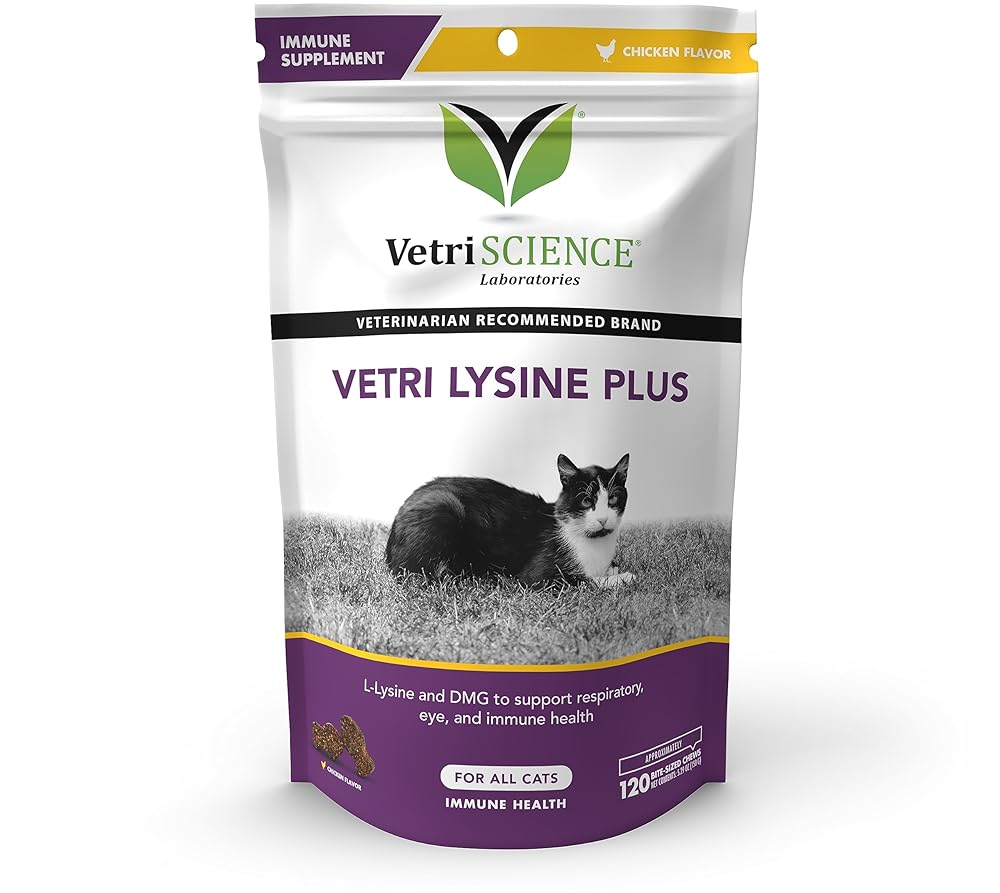Looking for the Best L-Lysine Supplements for Cats? As feline guardians, we strive to ensure our cats are at the peak of health, and sometimes, that means turning to supplements. L-lysine, an essential amino acid, has gained popularity for its potential benefits in boosting feline immunity, especially against certain viral challenges. This article will guide you through top picks in the market, shedding light on their features, benefits, and what makes them stand out. Dive in to discover the perfect L-Lysine supplement for your furry friend.
1. VetriScience Vetri Lysine Plus
VetriScience Vetri Lysine Plus is a product that is recommended by veterinarians to support immune and respiratory health in cats. It contains lysine, which may help prevent the replication of the FVR virus and manage signs associated with the Feline Herpes Virus. Additionally, lysine also supports immune system function and eye health in growing kittens. Each bag contains 120 chicken liver flavored chews and the product is manufactured in the USA. It is covered by the FoodScience, LLC 60-Day Satisfaction Guarantee.
2. Vetoquinol Viralys L-Lysine Supplement for Cats
Vetoquinol Viralys L-Lysine Supplement for Cats is a daily supplement designed to support the immune system and eye and respiratory health in cats of all ages. It is formulated to help manage common feline health issues such as sneezing, runny nose, and watery, inflamed eyes. The lysine powder is easy to administer and has a highly palatable fish and poultry flavor that cats love. It delivers the veterinarian-recommended amount of lysine, with cats requiring 500mg twice daily and kittens requiring 250mg twice daily.
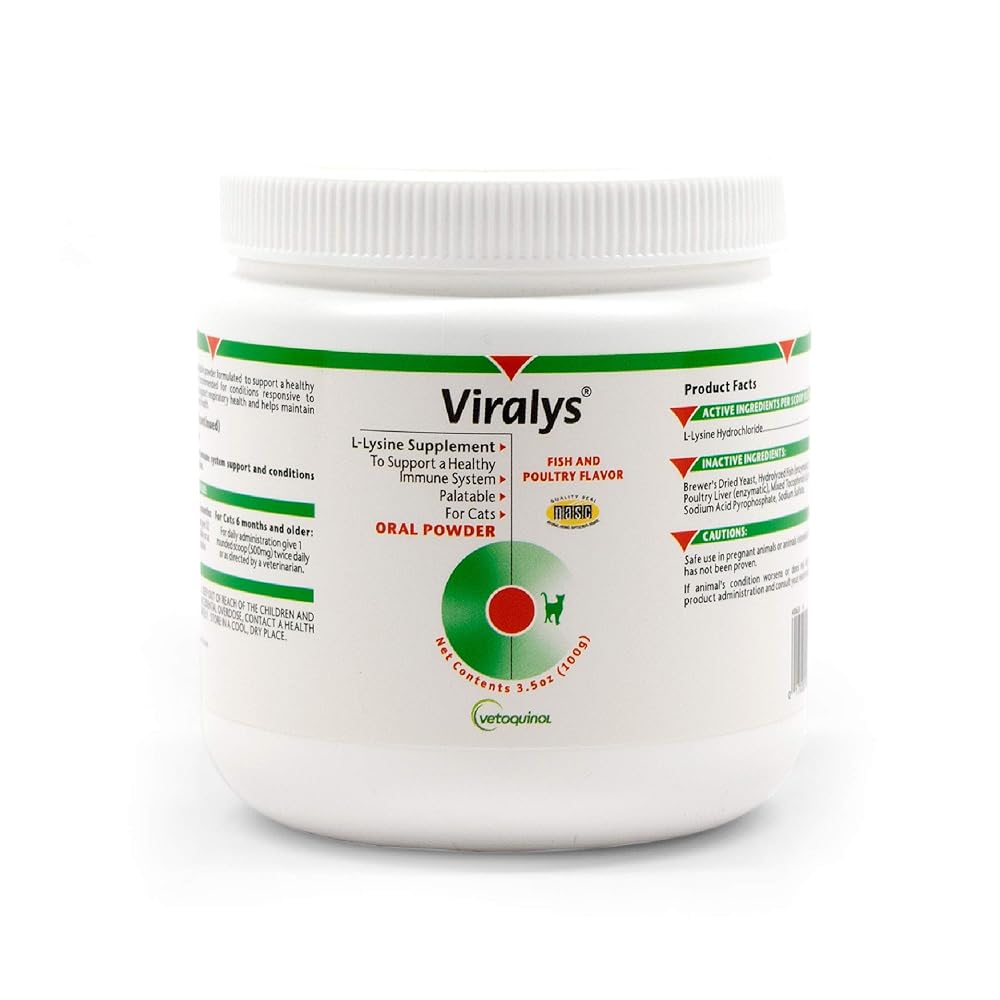
3. NOW Pet Health, L-Lysine Supplement, Powder
NOW Pet Health offers an L-Lysine Supplement Powder for cats that helps to support a healthy immune system, normal respiratory health, and ocular health. It is recommended by veterinarian Dr. Barbara Royal and has been certified by the National Animal Supplement Council (NASC). The product is formulated and manufactured with the same attention to quality as NOW’s supplements for humans and is packaged in the USA by a family-owned company. It can be given to cats during or after mealtime, with specific dosage instructions depending on the age of the cat.
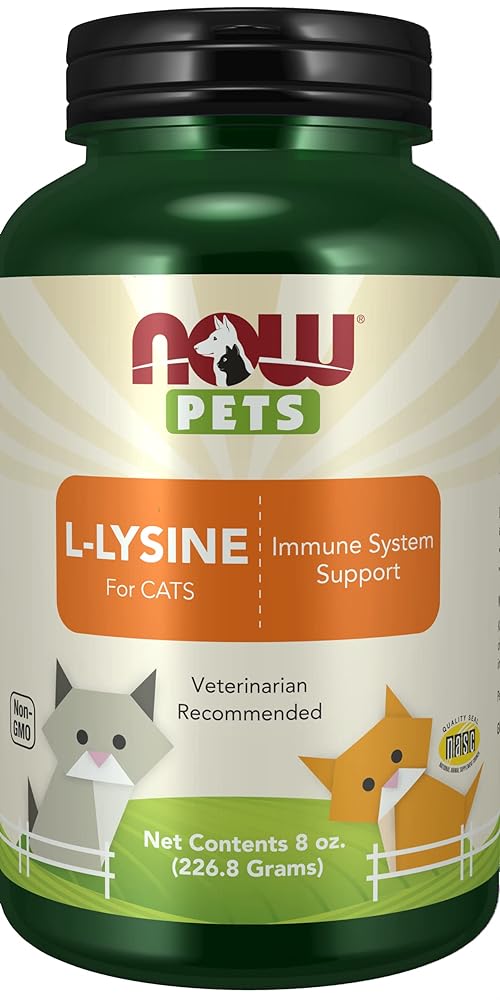
4. Pet Naturals Lysine for Cats, Chicken Flavor
Pet Naturals Lysine for Cats is a chicken-flavored chew that provides immune and respiratory support for cats. It is recommended by veterinarians and does not contain wheat or corn. Each chew contains 250mg of lysine, which helps manage or prevent sneezing, runny nose, and watery eyes. The product offers a 60-day supply and has a tasty chicken-liver flavor that cats will enjoy. It is formulated with vet approval and does not contain artificial ingredients.
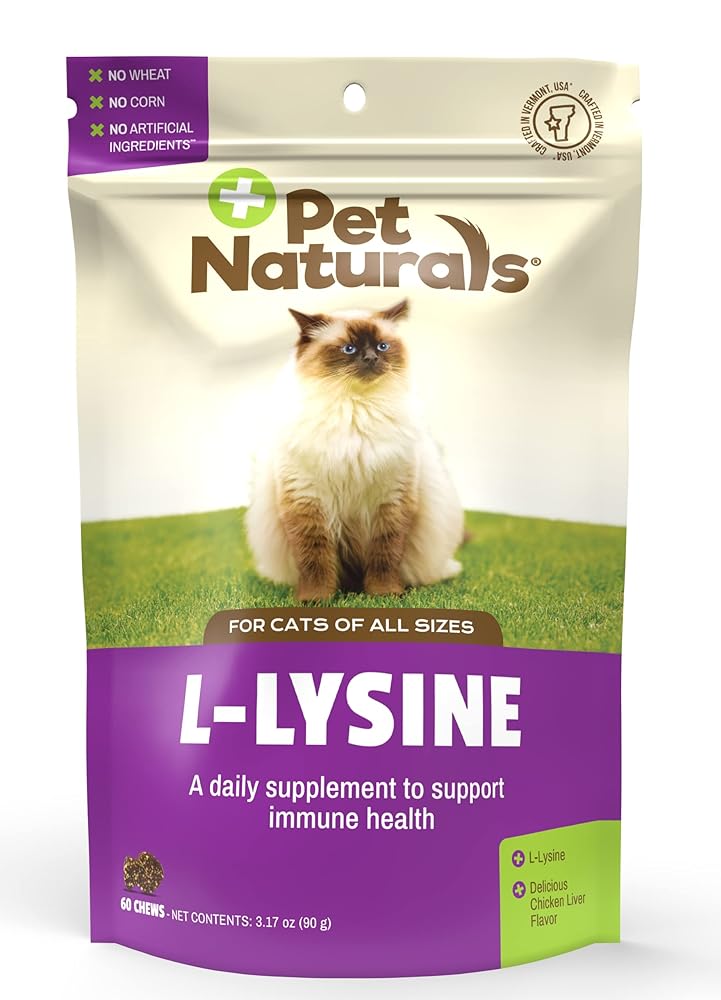
5. L-Lysine Supplement for Cats 4oz/120g
The L-Lysine Supplement for Cats is a powdered supplement designed to support immune function, eye health, and respiratory health in cats. It is formulated with natural ingredients and has a salmon flavor that cats find enticing. Manufactured in FDA-registered facilities in the USA, the supplement is veterinarian-approved and hypoallergenic. It may provide relief from symptoms such as sneezing, watery eyes, and runny noses in cats.
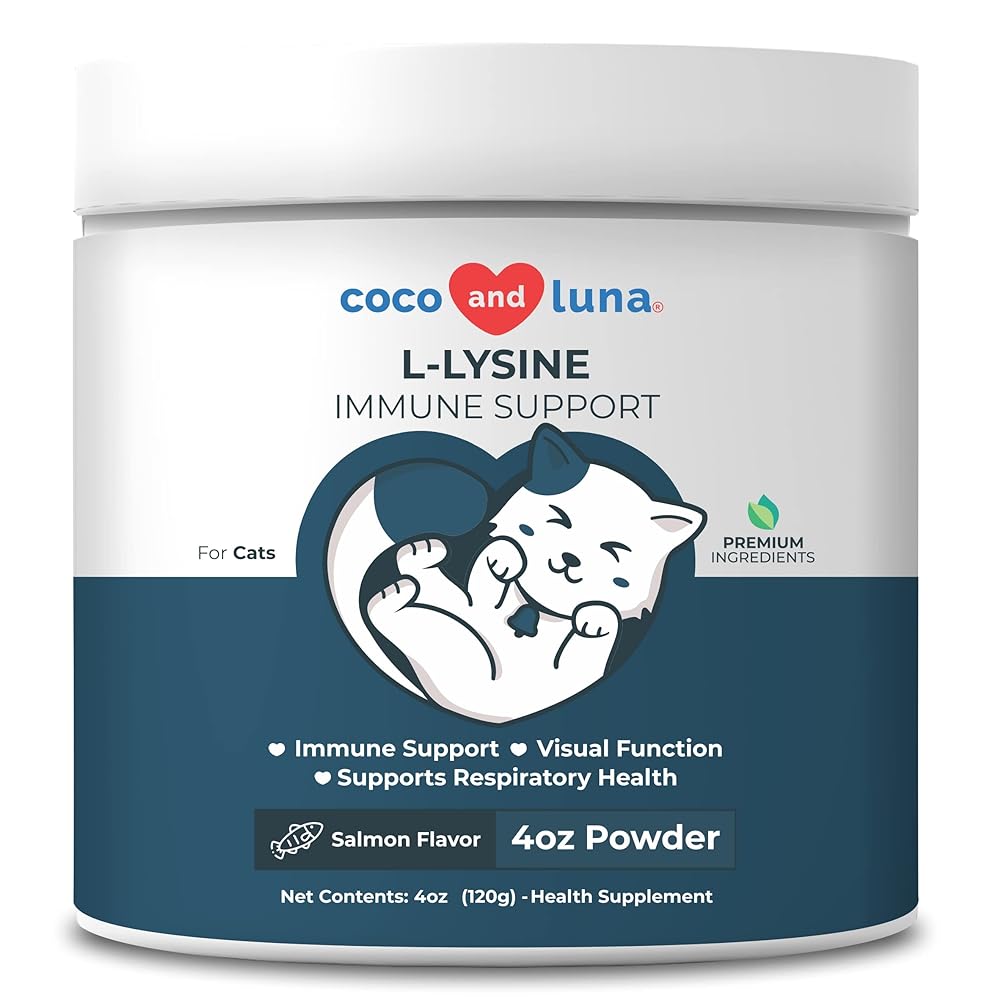
6. Vetoquinol Enisyl-F Oral Paste: L-Lysine Supplement for Cats
The Vetoquinol Enisyl-F Oral Paste is a daily lysine supplement designed for cats. It helps to support a strong immune system and promotes eye and respiratory health. This paste is formulated to manage common feline health issues such as sneezing, runny nose, squinting, and watery inflamed eyes. Cats and kittens enjoy the highly palatable tuna-flavored paste, making it easy to administer by adding it to their paws or noses.
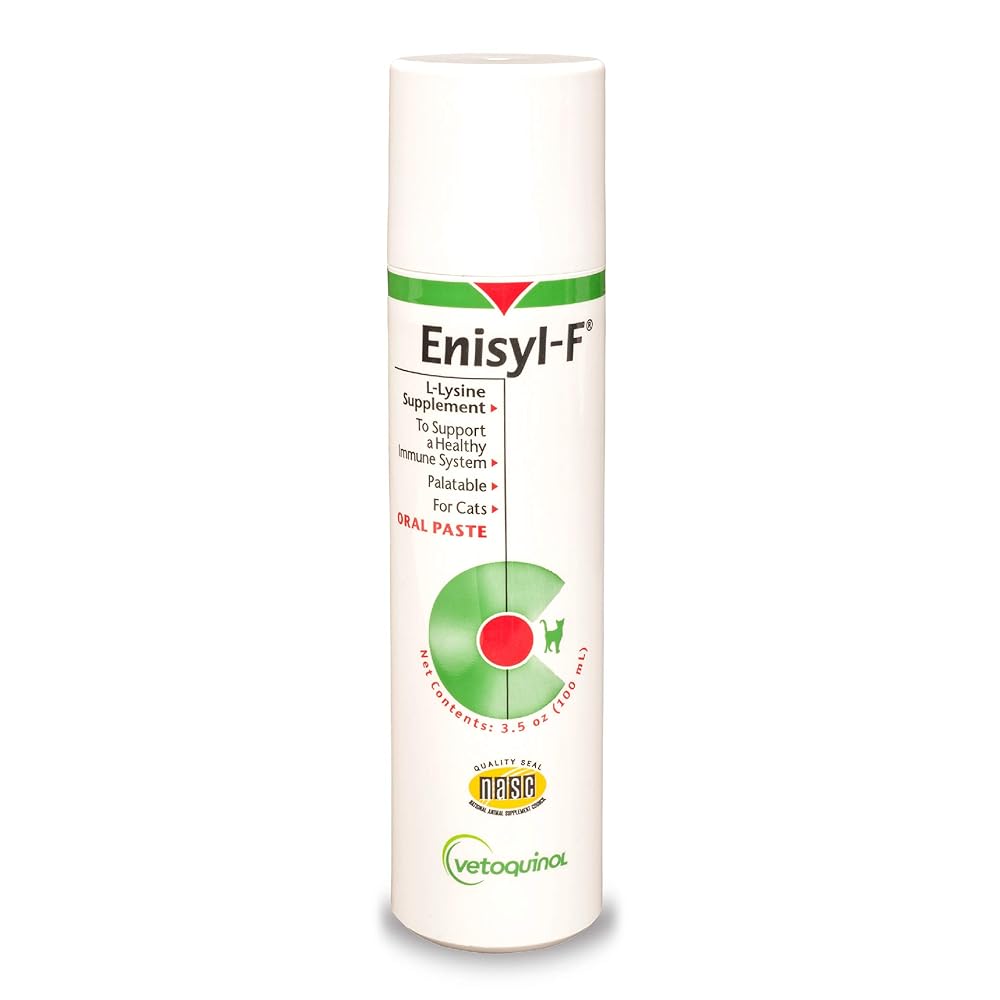
What Are The Benefits of L-Lysine for Cats?
Certainly! L-lysine is an essential amino acid that has become a popular supplement for cats due to its potential health benefits. Here are some of the key benefits of L-Lysine for cats:
- Feline Herpesvirus Management: One of the primary reasons L-Lysine is given to cats is its purported ability to help manage the symptoms of feline herpesvirus (FHV-1), which causes respiratory and ocular issues in cats. L-lysine is believed to compete with another amino acid, arginine, which the herpesvirus needs to replicate.
- Immune System Boost: L-lysine plays a role in the production of antibodies, enzymes, and hormones. By supporting these functions, it can help strengthen the cat’s immune system, making it more resilient to various health challenges.
- Protein Synthesis: As an amino acid, L-Lysine is crucial for protein synthesis, aiding in the proper growth and maintenance of tissues in the cat’s body.
- Calcium Absorption: L-lysine aids in the absorption of calcium from the digestive tract, which is vital for bone health and various cellular functions.
- Collagen Formation: L-lysine is a building block for collagen, an essential protein that supports skin, cartilage, and tendons. This can be particularly beneficial for wound healing.
- Antiviral Properties: Some studies suggest that L-Lysine may possess antiviral properties, which can be beneficial in reducing the severity or frequency of viral outbreaks in cats.
While L-lysine offers numerous benefits, it’s essential to note that not all cats may require supplementation. Before adding L-Lysine or any supplement to your cat’s diet, it’s crucial to consult with a veterinarian to ensure it’s appropriate for your pet’s specific needs.
What Should I Consider When Choosing a Lysine Supplement for My Cat?
When choosing an L-Lysine supplement for your cat, it’s essential to prioritize safety, efficacy, and the specific needs of your feline. Here are some factors to consider:
- Form of the Supplement: L-Lysine for cats is available in various forms, including powders, gels, chews, and capsules. Consider which form your cat might accept best. For instance, a picky eater might prefer a tasteless powder mixed into their food, while others may enjoy a flavored chew.
- Dosage: Ensure that the supplement provides a clear dosage recommendation based on the cat’s weight or age. It’s crucial to provide the right amount for efficacy without over-supplementation.
- Quality and Purity: Choose a reputable brand known for high-quality products. Look for supplements without unnecessary fillers, artificial colors, or flavors. Some products may carry third-party testing seals, which can indicate a higher standard of quality.
- Ingredients: While the primary ingredient you’re looking for is L-Lysine, some supplements may contain additional beneficial components, such as taurine, probiotics, or other vitamins. Ensure that any additional ingredients are safe and beneficial for your cat.
- Palatability: If the supplement isn’t tasty or at least neutral in flavor, it can be challenging to administer to your cat. Read reviews or get recommendations to find products that cats generally find palatable.
- Veterinarian Recommended: Supplements that are recommended or formulated by veterinarians often carry an assurance of safety and efficacy tailored for pets.
- Allergens and Sensitivities: Ensure the product doesn’t contain ingredients your cat might be allergic or sensitive to. This is especially important for cats with known food allergies or sensitivities.
- Cost and Availability: While cost shouldn’t be the sole determining factor, it’s practical to consider the price, especially if it’s a long-term supplement. Also, consider the availability – it’s beneficial if you can easily reorder the product when needed.
- Packaging and Storage: Consider how the supplement is stored. Some might require refrigeration after opening, while others might be stable at room temperature. A good seal is essential to maintain the supplement’s freshness and efficacy.
- Company Reputation: Research the company behind the supplement. Companies with a long-standing positive reputation in pet health are often more trustworthy.
Always consult with your veterinarian before introducing any new supplement into your cat’s diet. They can provide guidance tailored to your cat’s specific needs and health status.
Frequently Asked Questions About Lysine for Cats
- What are cat urinary, bladder, and kidney supplements used for? These supplements are designed to support and maintain the health of a cat’s urinary tract, bladder, and kidneys. They can help in preventing urinary tract infections, dissolving or preventing the formation of stones, and aiding overall kidney function.
- How do these supplements benefit my cat’s health? Such supplements can reduce inflammation, prevent urinary crystal formation, aid in toxin removal, and ensure proper hydration of the urinary system. They also help maintain a balanced pH level in urine, minimizing the risk of stone formation.
- Are these supplements a substitute for veterinary care? No, while these supplements can support urinary and kidney health, they are not a replacement for professional veterinary diagnosis, treatment, or preventive care. Always consult your vet before adding supplements to your cat’s diet.
- Can all cats take these supplements? Most cats can, but it’s always best to consult with a veterinarian first. Some cats may have underlying health conditions or be on medications that can interact with certain supplements.
- What ingredients should I look for in a good urinary or kidney supplement? Ingredients like cranberry extract, glucosamine, D-mannose, and marshmallow root can be beneficial. However, ensure the product is specifically formulated for cats and doesn’t contain potentially harmful additives.
- How can I get my cat to take these supplements? Many urinary and kidney supplements for cats come in palatable forms like chews, liquids, or powders. You can mix powders or liquids with their food, or offer chews as treats.
- Are there any side effects associated with these supplements? While most cats tolerate these supplements well, some might experience digestive upset. Always introduce any new supplement gradually and monitor for any adverse reactions.
- How long does it take to see results with urinary and kidney supplements? The timeframe can vary depending on the product and the specific health concern being addressed. Some cats might show improvement in a few weeks, while others may require a more extended period.
- Should I give my cat these supplements daily? The frequency depends on the specific supplement and your cat’s health needs. Some supplements are designed for daily use, while others might be given more intermittently. Always follow the recommended dosage on the product label or as advised by your vet.
- Are there any contraindications to using these supplements? Certain medications or health conditions might contraindicate the use of some urinary or kidney supplements. It’s essential to inform your veterinarian of any medications or other supplements your cat is taking.
Final Summary: The Best L-Lysine Supplements for Cats
In this article, we reviewed the Best L-lysine supplements for Cats. Our goal was to provide you with a comprehensive guide to make informed decisions for your feline’s health. L-lysine is a vital supplement that can offer numerous benefits for cats, especially in bolstering their immune system. Remember, while supplements can be beneficial, it’s always essential to consult with your veterinarian before introducing any new product into your cat’s regimen. Your feline’s well-being is paramount, and choosing the right supplement is a step in the right direction.

